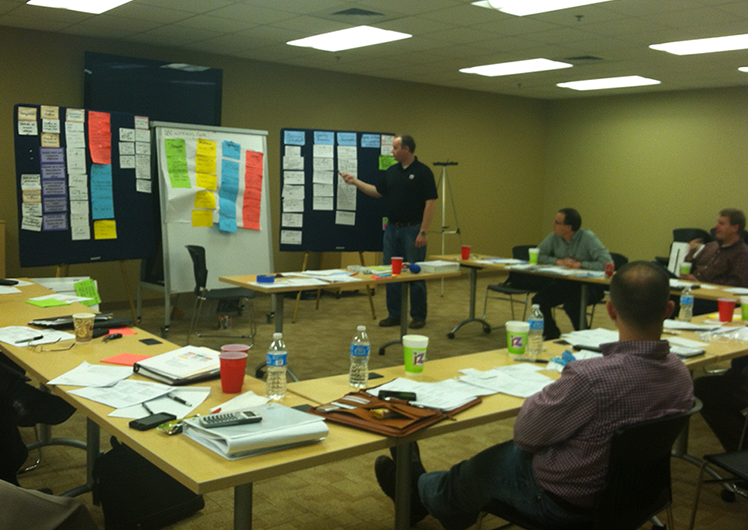Roll Up Your Sleeves – Living & Leading in a World of Constant Change, Part 2
Yesterday I wrote about two foundational concepts:
One Unshakable Truth – Everyone has unseen battles they are fighting. Be kind.
Change is not the same as transition.
Change is an event. Transition is the emotional stages people go through when change happens.
Today the observation is – Personality matters. Every person has a unique way he or she reacts and works through transition. How and when a person rolls up their sleeves and regains their purposeful place is on their clock, not yours.
One size fits one. Each person has a distinct personality that was formed from both nature and nurture. I could talk about the different personality styles, the components that go into a person’s communication styles and such things as that, but I believe you would probably prefer something more practical. So how about a 5-minute, non-scientific, un-validated “how I manage the stress of transition” quiz?
The goal of this exercise is not for you to clearly define your personality, but to raise your awareness that every person has a different, sometimes difficult, personality and you do too. I’d also like you to consider how different personality types show up during the transition phases we discussed yesterday, and I’ll offer a helpful suggestion or two for you to consider to aid you and others along the Wave.
My Transition Stress Management Style: A 3-Step Self-Awareness Quiz
Step 1 – Instructions: There are four descriptions listed under each statement below. Complete each of the “I am” statements by circling 2 of the 4 behavioral descriptions that seem to fit how you see yourself.
I am most satisfied in an environment where I have…
A. Plenty to do – am very busy
B. Freedom from rules and restrictions
C. Details on what to do and how my work needs to be carried out
D. A lot of time to think and reflect
I am happiest in a place where I …
A. Can implement and control how things get done
B. Receive individualized rewards
C. Am free from constant social demands
D. Experience minimal interruptions
I am at my best when I …
A. Deal with many very challenging assignments at once
B. Experience a variety of projects/topics each day
C. Can make sure quality standards are not compromised
D. Am encouraged to create and innovate new approaches
I am motivated to do my best when my manager is …
A. Firm, objective when giving me an assignment
B. More low-key and laid-back in their approach
C. Clear about roles and makes sure people stay in their lane
D. Asks for my opinion when he or she institutes a change
Step 2 – Tallying Instructions:
Talley: Look over your choices in Step 1. Talley the number of A’s, B’s, C’s or D’s you circled. Then record your totals below to the left of each of the letters below.
I circled …
____ A’s
____ B’s
____ C’s
____ D’s
Step 3 – Discovery of Ways to Motivate Yourself
Instructions:
– The letter above with the highest number represents your most likely approach to transition. If you have a tie, you can go back to the Step 1 and rank your two choices as primary or secondary or just move on and decide which descriptions below feels right to you. Remember this is not a test to get right. It is something to help you appreciate that each person sees things in different ways, and to remember to Be Kind to yourself and others.
– Find your letter A, B, C, D letter and mark it on the Stress Descriptions and Helpful Hints list below. Consider some of the strategies listed under your letter choice if you think you want or need to make a step forward in your transition.
Stress Descriptions and Helpful Hints
A. If your highest total was an A, when you are feeling stressed, you may become argumentative, lacking empathy or dominating. If this seems true to you, consider these ideas as a way to move yourself forward.
- Ask for more work to do or offer to help someone so you have plenty on your plate.
- Find a hands-on project you can complete start to finish and control in a short time.
- Enlist a direct and confident mentor who will push you to accomplish something big.
- Plant a tree, clean a room or repair something that been broken for a while
B. If your highest total was B, when you are feeling stressed, you may become needlessly busy, detached or very disorganized. If this seems true to you, consider these ideas as a way to move forward.
- Set a clear measurable goal and find someone who will hold you accountable.
- Find a project in a new area or learn something new at work or home.
- Establish a structure and system that helps track or monitor your to-do list
- Focus on being where your feet are- don’t multi-task- complete one important( not urgent) project each day
C. If your highest total was C, when you are feeling stressed, you may become somewhat withdrawn, over-controlling or resistant. If this seems close to true to you, consider these ideas as way to take a next step forward.
- Bow out of some of your commitments that involve interacting with lots of people.
- Ask for clarity of your role often during this period of change.
- Review the policies and procedures you have used in the past and see if they will stay the same or shift in the current situation.
- Create a to-call list of friends and use a check system list and reach out twice a week
D. If your highest total was a D, when you are feeling stressed, you may become more pessimistic, too idealistic or indecisive. If this seems somewhat true to you, consider these ideas as a way to make your next step forward.
- Tell those around you that you need to be alone for certain short periods of time.
- Make careful notes on what you hear about expectations people have of you and verify with that person so there are fewer misunderstandings.
- Schedule extra time to think and reflect on big picture ideas with a friend or partner.
- Paint or draw a picture, do a coloring book, write a poem or send a note to someone you feel needs a lift.
Please keep top of mind the idea that the reactive or negative side of an individual’s personality will likely be more prominent when they are in the Resisting stage than if he or she is moving through the Exploring or Committing phase. Remember people don’t always follow the phases in order but can and do move ahead and step back on their Wave.
Journal Entry: How can you acknowledge the value of a person with a different personality and who may also be in a different stage of transition than you? Consider asking her or him to take the Quiz, talking about what you saw or realized and maybe having a chuckle about your results. Learning about yourself and laughter can be like medicine to help you get through this transition in your Leadership and Life.
“A cheerful heart is good medicine, but a crushed spirit dries up the bones.” Proverbs 17:22 (The Bible NIV)
“Life is short. Break the rules. Forgive quickly. Kiss slowly. Love truly. Laugh uncontrollably. And never regret anything that makes you smile.” Mark Twain.
Tomorrow’s observation will be Role Clarity Counts. People are structure-seeking beings. When change hits, each person needs to talk about his or her role and how the change will affect them and the ones they love.



